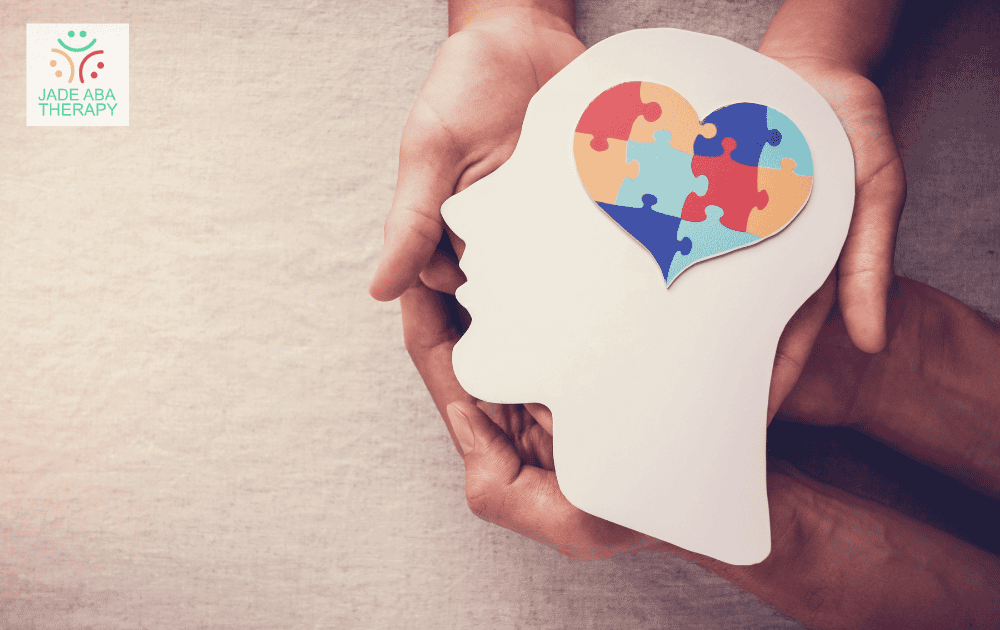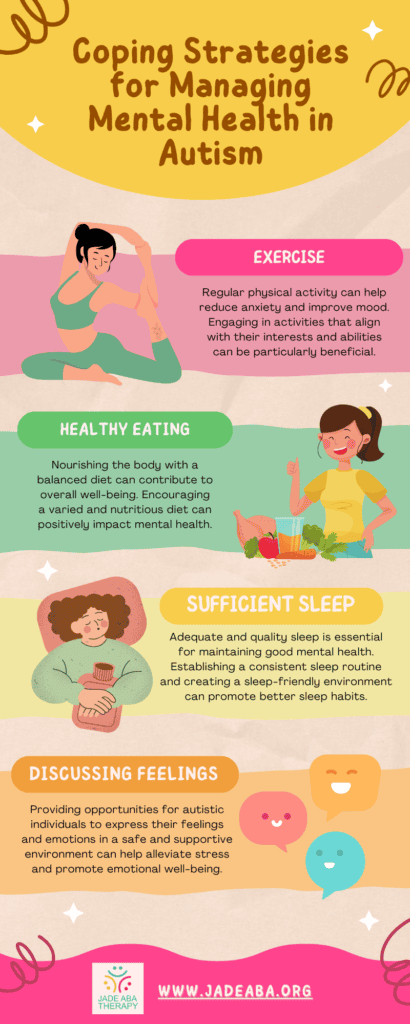Autism, or autism spectrum disorder (ASD), is a developmental disability and a type of neurodivergence, not a mental illness. However, autistic individuals are at a greater risk for developing mental health conditions compared to the general population. In fact, according to the autism research charity Autistica, 7 out of 10 autistic individuals have a mental health condition such as anxiety, depression, ADHD, or OCD.

Overview of Autism and Mental Health
Autism is characterized by common traits that many autistic individuals experience, including difficulties understanding others’ emotions, having a different way of understanding information, and sensitivity to light, sound, touch, taste, or smell. These traits can impact an individual’s mental well-being and contribute to the development of mental health conditions.
It is essential to recognize that autistic individuals may find it challenging to communicate their feelings. Providing support through tailored communication, such as clear and direct questions, and allowing them time to process information, is crucial for positive interactions. Additionally, maintaining regular routines can help reduce anxiety levels as change can be distressing for individuals with autism.
Common Mental Health Conditions in Autism
Depression and anxiety are two of the most common co-occurring mental health issues for individuals with autism. The prevalence of mental illness is higher among autistic individuals than in the general population. This may be due to a genetic link between autism and mental illness or the challenges faced by autistic individuals in the modern world.
Other mental health conditions that they may experience include attention-deficit/hyperactivity disorder (ADHD), obsessive-compulsive disorder (OCD), and other mood disorders. It is important to approach mental health in autism with a holistic perspective, considering the unique needs and challenges faced by each individual.
To support the mental health of autistic individuals, it is crucial to emphasize the importance of habits like exercise, healthy eating, sufficient sleep, and discussing feelings with trusted individuals. Creating a supportive environment that recognizes and accommodates their specific needs can greatly contribute to their overall well-being.
Understanding the relationship between autism and mental health is essential for promoting a supportive environment and providing appropriate care and support to individuals on the autism spectrum. By recognizing the common mental health conditions that autistic individuals may experience, we can work towards fostering a better understanding and improving the overall mental well-being of individuals with autism.

Challenges Faced by Autistic Individuals
Living with autism presents unique challenges, particularly in the areas of sensory sensitivities and social communication. Understanding these challenges and implementing effective coping strategies is essential for promoting mental health.
Sensory Sensitivities and Social Communication
People on the spectrum often experience sensory sensitivities, which can make everyday experiences overwhelming. Many autistic individuals have heightened sensitivity to light, sound, touch, taste, or smell. This heightened sensitivity can lead to sensory overload and increased anxiety levels. For example, a loud noise or a crowded environment may cause distress and discomfort.
In addition to sensory sensitivities, autistic individuals may also face difficulties in social communication. They may struggle to understand and interpret others’ emotions, have a different way of understanding information, or find it challenging to express their own feelings. This can lead to difficulties in building and maintaining relationships, as well as feelings of isolation and frustration.
To support them in managing these challenges, it is crucial to create an environment that accommodates their sensory needs. This may involve providing a quiet space for them to retreat to when they feel overwhelmed or minimizing sensory triggers in their surroundings. Additionally, tailored communication techniques, such as using clear and direct questions and allowing them time to process information, can help facilitate better social interactions.
Coping Strategies for Managing Mental Health
Coping strategies play a vital role in managing the mental health of autistic individuals. Developing effective strategies can help reduce anxiety, improve emotional well-being, and enhance overall mental health. Young autistic individuals have emphasized the importance of certain habits in managing their mental health, including:

Furthermore, maintaining regular routines can be particularly important for autistic individuals, as change can be distressing. Consistency and predictability in daily activities and schedules can help reduce anxiety levels.
By understanding and addressing the challenges they face in terms of sensory sensitivities and social communication, as well as implementing effective coping strategies, we can create a supportive environment that promotes mental health and well-being for those on the autism spectrum.
Misconceptions and Diagnoses
In order to promote mental health in individuals with autism, it is important to address misconceptions and understand the relationship between autism as a neurodevelopmental disorder and co-occurring mental illnesses.
Autism as a Neurodevelopmental Disorder
It’s essential to once again clarify that autism spectrum disorder (ASD) is a developmental disability and a type of neurodivergence, not a mental illness. While it is listed in the Diagnostic and Statistical Manual of Mental Disorders (DSM-5), autism is classified as a neurodevelopmental disorder. This distinction is crucial to dispel misconceptions and promote accurate understanding.
Autism is characterized by differences in social communication, sensory sensitivities, and repetitive behaviors. It is a lifelong condition that affects individuals in diverse ways, with a wide range of strengths and challenges. Understanding autism as a neurodevelopmental disorder helps foster a supportive environment that acknowledges the unique needs and abilities of individuals on the autism spectrum.
Co-Occurring Mental Illnesses and Misdiagnosis
There’s a potential overlap between autism traits and certain mental illnesses. Depression and anxiety are the most common co-occurring mental illnesses for individuals with autism.
The presence of overlapping symptoms can sometimes lead to misdiagnosis, where autistic individuals may be diagnosed solely with a mental illness without considering their underlying autism. This misdiagnosis can hinder appropriate support and interventions tailored to their specific needs.
It is crucial for healthcare professionals to receive training in recognizing the unique traits and challenges associated with autism. By understanding the distinct features of autism and mental illness, accurate diagnoses can be made, leading to more effective treatment and support strategies.
Research suggests that mental illness is more common among autistic individuals than in the general population. This may be due to a genetic link between autism and mental illness or the challenges faced by autistic individuals in navigating a world that is not always accommodating to their needs.

Impact of Secondary Diagnoses
When it comes to autism, it is not uncommon for individuals to receive additional developmental diagnoses alongside their autism diagnosis. These secondary diagnoses can include conditions such as ADHD, hyperlexia, learning disabilities, savant syndrome, or other disorders. While having a secondary diagnosis can sometimes provide direction for therapy, academic support, and services, it is important to understand the impact these diagnoses can have on individuals with autism.
Each individual’s experience with autism and their secondary diagnosis will be unique. The presence of a secondary diagnosis does not diminish the significance of autism itself but rather provides a more comprehensive understanding of an individual’s strengths and challenges.
Challenges of Misinterpreting Autism Traits
Misdiagnosis or misinterpretation of autism traits can occur when individuals are not initially evaluated for autism. This is particularly common among individuals who are verbal and of average intelligence. In some cases, children with autism may receive other diagnoses, such as mental disorders, before being evaluated for autism. This can lead to a misunderstanding of autism traits, which may be seen as individual issues or signs of another mental illness.
It is crucial to understand the distinct characteristics of autism and differentiate them from symptoms of other conditions. For example, autistic children may exhibit anxiety-related behaviors that overlap with obsessive-compulsive disorder. Challenges in social communication may resemble narcissistic personality disorder, and emotional meltdowns may be mistaken for oppositional defiant disorder in the absence of an autism diagnosis.
By recognizing and understanding these behaviors within the context of autism, misdiagnosis can be minimized, and appropriate support and interventions can be provided.
Understanding the impact of secondary diagnoses and avoiding the misinterpretation of autism traits are essential steps in promoting the mental health and well-being of individuals with autism. By providing accurate assessments and interventions that address the specific needs associated with both autism and any co-occurring developmental diagnoses, we can create a more supportive environment for individuals on the autism spectrum.
Behavioral Overlaps and Understanding
To fully understand autism and mental health, it’s important to recognize the behavioral overlaps and understand how they can manifest in individuals on the autism spectrum. Two common areas of concern are anxiety-related behaviors and obsessive-compulsive disorder (OCD), as well as social communication challenges and emotional meltdowns.
Anxiety-Related Behaviors and OCD
Anxiety is a common co-occurring mental health condition among individuals with autism. Anxiety-related behaviors in autism can manifest in various ways, including excessive worrying, restlessness, irritability, and difficulty with transitions or changes in routine.
In some cases, individuals with autism may also experience symptoms consistent with OCD. OCD is characterized by intrusive thoughts and repetitive behaviors that are difficult to control. These behaviors, known as compulsions, are often performed in an attempt to alleviate anxiety or prevent perceived harm. It’s important to note that not all individuals with autism will experience OCD, but when present, it can significantly impact their daily lives.
Understanding the link between anxiety-related behaviors and OCD in autism is crucial for providing appropriate support. Strategies such as cognitive-behavioral therapy (CBT), medication, and sensory-based interventions can be beneficial in managing these challenges. It’s essential to work closely with healthcare professionals to develop an individualized approach that addresses the specific needs of each individual with autism.

Social Communication Challenges and Emotional Meltdowns
Another aspect of the behavioral overlaps in autism involves social communication challenges and emotional meltdowns. Many individuals on the autism spectrum have difficulties understanding others’ emotions and expressing their own feelings. This can make social interactions more challenging and may lead to misunderstandings or difficulties forming and maintaining relationships.
Communication difficulties can contribute to emotional meltdowns, where an individual becomes overwhelmed by emotions and may exhibit intense reactions such as crying, shouting, or physical agitation. Emotional meltdowns are not tantrums but rather a response to sensory overload, frustration, or other triggers. It’s important for caregivers and support networks to provide a calm and understanding environment during these moments, allowing the individual to express their emotions in a safe and supportive way.
Supporting individuals with autism in managing social communication challenges and emotional meltdowns requires patience, empathy, and tailored communication strategies. Clear and direct questions, visual supports, and allowing sufficient processing time can enhance positive interactions. Additionally, maintaining regular routines and providing predictability can help reduce anxiety levels and contribute to better emotional regulation.
Recognizing the behavioral overlaps and understanding how anxiety-related behaviors, OCD, social communication challenges, and emotional meltdowns can manifest in autism is crucial for promoting mental health in individuals on the autism spectrum. By providing appropriate support and interventions, we can create a more supportive and inclusive environment that enables individuals with autism to feel supported and thrive.
Sources:
- https://www.mentalhealth.org.uk/explore-mental-health/a-z-topics/autism-and-mental-health#:~:text=Just%20like%20everyone%2C%20autistic%20people,%2Dcompulsive%20disorder%20(OCD).
- https://www.youngminds.org.uk/young-person/mental-health-conditions/autism-and-mental-health/
- https://www.verywellhealth.com/is-autism-a-mental-illness-4427991